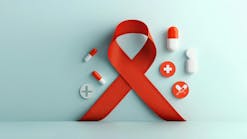A research team at the Technical University of Munich (TUM) has quantified the effects of an infection with the Human Immunodeficiency Virus (HIV) on the development of cervical cancer. Their results show that the risk of developing cervical cancer is six times higher in women who are infected with HIV, and Southern and Eastern Africa are particularly affected, according to a press release.
According to statistics from the World Health Organization (WHO), cervical cancer is the fourth most common type of cancer for women. In 2018 an estimated 570,000 women worldwide were diagnosed with cervical carcinoma, with approximately 311,000 of these women dying.
Cervical cancer is the most frequently detected cancer for women who live with HIV, since their immune systems are weakened by the HIV infection.
On the other hand, cervical cancer, usually caused by Human Papillomavirus (HPV), is also one of the most successfully preventable and treatable types of cancer, as long as it is detected at an early stage and treated effectively.
The study has been published in Lancet Global Health.
The authors conducted a systematic review as well as a meta-analysis of a total of 24 studies from the years 1981 to 2016, in which 236,127 women with HIV from four continents (Africa, North America, Asia and Europe) participated.
These studies covered a total of 2,138 cervical carcinoma cases. The results were linked with data from UNAIDS on worldwide HIV infection and with data on cervical carcinoma from the International Agency for Research on Cancer (IARC), the WHO's Cancer Research Center, and then evaluated.
The objective of the study was to calculate the share of women living with HIV among the number of women with cervical cancer. The authors found that 5.8 percent of all new cervical cancer cases worldwide in the year 2018 were diagnosed for women with an HIV infection. This is equivalent to 33,000 cases a year, 85 percent of which occurred in Sub-Saharan Africa.
Furthermore, based on their results the team was able to show that women with HIV have a sixfold higher risk of developing cervical cancer than women without HIV infection.
The regions of the world most strongly affected are southern and eastern Africa, where respectively 63.8 percent and 27.4 percent of cervical carcinomas were diagnosed in women with an HIV infection.
Based on the results, the TUM authors determined that women with an HIV infection have a significantly higher risk of developing cervical cancer. They also pointed out that this means that HPV vaccinations and early-stage cervical carcinoma screenings are of particular importance, especially in the African countries south of the Sahara.





